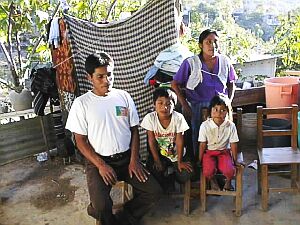Home >>
Oaxaca >>
Oaxaca, Oaxaca >>
An Expatriate Life >>
Letters >>
How Ya Gonna Keep 'Em
[In the spring of 1994, I met some young people who had come to the big city of Oaxaca. This is a synthesis of what they told me about the life they left.]
Jose has gone the way of all too many campesinos: to the city. In Oaxaca, as in North Dakota, Khazakstan or Natal Province, the bright lights (often unaffordable), the gadgets (often wasteful and unusable) and the jobs (often illusory) draw the curious, the ambitious and the desperate. The overcrowding, crime, inflation and pollution are part of the price they, and we determined urbanites, pay for the joys and opportunities of metropolitan life.
Mostly, it's economics that brings them here. There are almost no jobs in the remote mountain villages of Oaxaca. People make a subsistence living providing themselves and each other with the basic necessities of life. Jose's family has three cows. With the extra milk, they make cheese to trade for beans, cloth or the occasional piece of bacon. They pay the guy who grinds their flour with wood for his cooking fire. They get by, as they have for hundreds of years. Their house has a dirt floor. There is no door in the doorway; no glass in the windows. The chickens and the pig wander in and out of the house. There is no electricity; no telephone; no running water in the house.

This family came to Oaxaca from a small town hours away by bus. They are living in very primitive conditions for now, but hope that one day their hard work and sacrifice will pay off in a better life for themselves and their children.
[Photo by Diana Ricci]
|
Recently, they installed an outdoor shower: a tank on stilts with a shower head sticking out. The tank is filled from the nearby river, using a hand pump. You stand on a wood platform to keep out of the mud.
There is a Conasupo -- government-owned store -- in the village, where everyone goes to buy canned goods, petroleum products, paper goods, and other luxury items. The Conasupo is run by the community. Its manager is elected, and must report on its financial situation at community meetings. Although it is audited by the government, and while stock is mostly chosen from what is available in the central warehouse, it belongs to the community and is the sole repository of the community's liquid assets. There is no bank.
There is a community development agency at work in the area, and the representative -- much like the Agricultural Extension workers, found until recently to in our own rural areas -- acts as an advisor and as a resource person for the community's needs. For example, he recently assisted the village council, of which Jose's father is currently the chair, to get cement, structural metals, electric wire and other materials to construct the first "modern" elementary school. It was difficult because like many other villages, this one does not always vote 100% for the ruling Party of the Institutional Revolution (PRI), and the rural self-help agency that doles out the materials is a creature of the government.
The villagers built the school themselves. They do everything for themselves. There is a list kept by the council, and everyone's name is on it. Service to the community is mandatory, and each task is assigned a certain number of points. Someone who fails to accumulate enough points may be stripped of the community's protection. For example, if they have a complaint against a neighbor for unauthorized use of their land, or for failure to pay a debt, the village tribunal may refuse to help them resolve their problem.
(Village tribunals have enormous powers, including life or death. Cases of municipal execution are occasionally reported in the press. Generally, the entire community meets to debate death sentences, but this is not always the case.)
There is a casita (little house), which contains the post office and the only telephone. The busybody who runs it lives in the rear of the building. She is a political appointee, and behaves like a commissar. Last week, Jose's ten-year-old sister received a letter from a cousin in Veracruz. The postmistress showed it to her, but told her she couldn't have it for another month because she had not been "respectful enough" to her lately.
Of Jose's five brothers and sisters, all except the youngest two have left the village and come to the state capital to study and / or work. Once the ones still at home are old enough, they will more than likely follow in the footsteps of their older brothers and cousins.
(April, 1994)
| Top of page |
